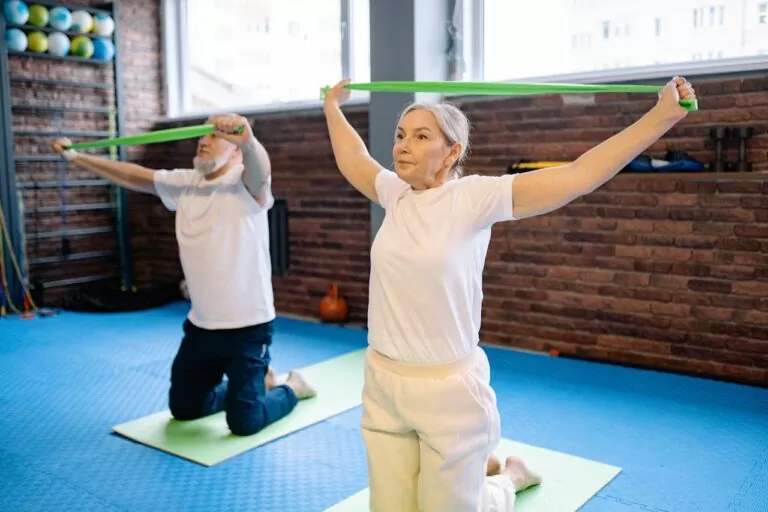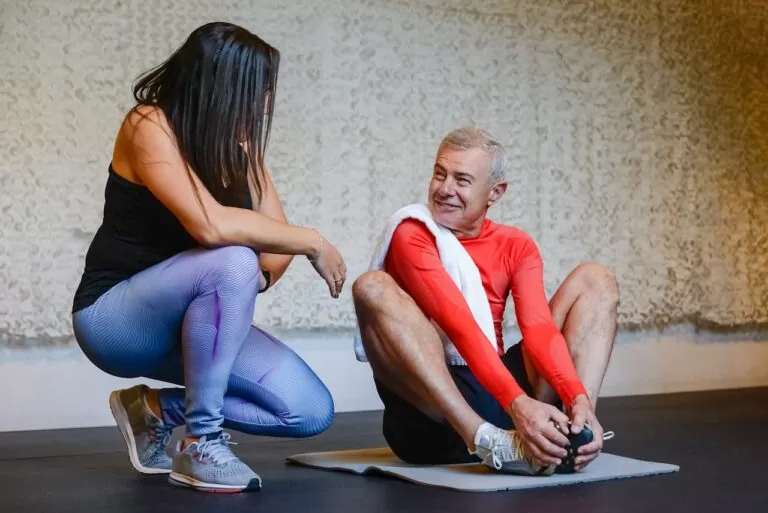Falls are one of the leading causes of injury among older adults. When the elderly fall, it often leads to injuries, reduced independence, and decreased quality of life. Assessing fall risk and implementing fall prevention strategies is essential for maintaining health and independence. Fall prevention exercises can significantly reduce the risk of falls by improving strength, balance, and coordination.
Benefits of Balance Exercises for the Elderly
Engaging in balance exercises offers numerous benefits:
✔ Reduced Fall Risks: Regular balance workouts help strengthen muscles and improve stability, significantly lowering the chances of falls.
✔ Improved Mobility and Independence: Enhanced balance and coordination make daily activities easier and safer.
✔ Increased Confidence: Seniors who regularly perform balance exercises often feel more confident in their ability to move around without fear of falling.
✔ Enhanced Well-being: Exercise promotes better mental and physical health, contributing to a higher quality of life.
Basic to Advanced Balance Exercises
1. Seated Exercises:
- Marching in Place: Sit in a sturdy chair and lift one knee at a time, mimicking a marching motion. This exercise helps build strength in the lower body while maintaining stability.
- Heel-to-Toe Walk: Sit and place one foot directly in front of the other, heel to toe, then reverse. This helps with coordination and balance.
2. Standing Exercises:
- Single-Leg Stand: Hold onto a chair for support and lift one foot off the ground, maintaining your balance on the standing leg. Switch legs after a few seconds.
- Side Leg Raise: Stand behind a chair and lift one leg to the side, then lower it back down. Repeat with the other leg. This strengthens the hip muscles and improves balance.
3. Dynamic Balance Exercises:
- Heel-to-Toe Walk (Standing): Walk in a straight line by placing the heel of one foot directly in front of the toes of the other foot. This exercise enhances dynamic balance.
- Tandem Walking: Similar to the heel-to-toe walk but performed continuously, helping to improve balance and coordination.
4. Using Equipment:
- Balance Ball Exercises: Sitting on an exercise ball can improve core strength and stability. Start with basic sitting and progress to more challenging movements like lifting one foot off the ground.
- Foam Pad Exercises: Standing on a foam pad adds instability, which helps enhance balance and proprioception.
Practical Tips for Seniors
Training as an elderly can be challenging in the beginning, but here are some key tips to help you navigate this process:
- Start Slowly: Begin with basic exercises and gradually progress to more advanced ones.
- Safety First: Use a sturdy chair or wall for support, especially when starting new exercises.
- Consistency is Key: Aim to perform balance exercises at least three times a week for optimal results.
- Listen to Your Body: Avoid exercises that cause pain or discomfort. Consult a healthcare professional if unsure.
- Stay Hydrated: Drink plenty of water before and after workouts to stay hydrated.
Common Questions about Fall Prevention Exercises:
- What are the common causes of falls in the elderly?
Common causes include muscle weakness, poor balance, vision problems, and environmental hazards.
- How often should elderly individuals perform balance exercises?
Ideally, balance exercises should be performed at least three times a week.
- Are there any specific exercises to avoid for seniors at risk of falls?
Avoid high-impact exercises or those that require sudden movements. Focus on low-impact, controlled activities.
- What are some signs that indicate an increased risk of falling?
Difficulty walking, dizziness, and unsteady gait are signs of increased fall risk.
- Can balance exercises help improve mobility and independence in the elderly?
Yes, regular balance exercises can significantly enhance mobility and independence.
Gain Mobile Strength With Healthproof
Fall prevention exercises, particularly balance exercises for elderly individuals, are essential for reducing fall risks and improving well-being. By incorporating these exercises into their routine, seniors can enjoy a safer, more independent lifestyle.
If you’re looking for physiotherapy in the comfort of your home, we’re here to help! At Healthproof, we are dedicated to assisting seniors in improving their quality of life. If you’re in Sydney or Melbourne, don’t hesitate to contact our team, who is ready to help you in your health and well-being.




